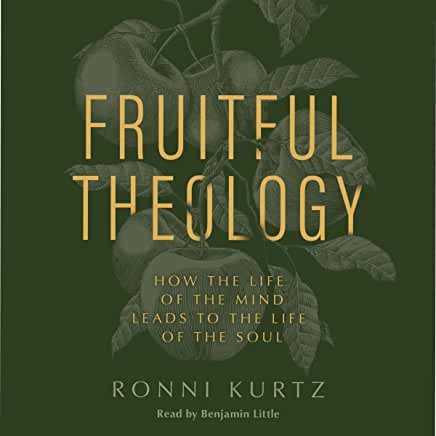Ronni Kurtz, Fruitful Theology: How the Life of the Mind Leads to the Life of the Soul. B&H Publishing, 2022.
Theology gets a bad rap these days. Many Christians believe that studying theology and devotion to Jesus are somehow antithetical pursuits. Theology leads to division, after all, and aren’t we supposed to seek unity? All that doctrine stuff is tantamount to arguing about how many angels can dance on the head of a pin, and so on. (The answer’s 42, by the way.)
Part of this reputation is deserved, frankly, but it’s not the fault of theology itself. (How could it be, when theology is simply, to use John Webster’s definition, “the study of God and all things in relation to God?”) Rather, it’s the fault of how we do theology. Theologians (of both the amateur and professional varieties) can be jerks, especially online. We often act like we’re looking to win arguments more than to understand the things of God. We love scoring points more than we love those with whom we disagree, and it has let many to forswear the pursuit of theology altogether.
But in his new book, Fruitful Theology, Ronni Kurtz argues that things don’t have to be this way. If God is who he is, then theology can’t be just another subject to argue about. As Kurtz puts it: “God is more than a set of facts to be examined; he is the one who calls forth the cosmos by the word of his power, and he will be not merely examined but exalted”.
Kurtz’s thesis is that “the life of the mind can, and should, lead to the fruit of the Spirit”. Each chapter takes one of the fruit of the Spirit from Galatians 5 and shows how doing theology well should result in a life characterized by that fruit. So, for example, in his chapter on love, Kurtz shows how a true theological understanding of who God is (“God is love”) and what he has done for us in Christ must necessarily result in love for God, others, and ourselves.
Of particular help is a list of resources in an appendix for the person just aspiring to take up the task of theology. I particular love the fact that that in addition to the more modern books commonly (and rightly) recommended as an introduction to theology (such as Packer’s Knowing God), Kurtz’s list includes such gems from church history as Athanasius’s On the Incarnation and Wilhelmus à Brakel’s The Christian’s Reasonable Service.
Our churches are impoverished by a lack of deep thinking about the things of God. If we are to overcome this condition, then we have to find ways to do theology that don’t fall into the trap of divisiveness and argumentativeness. Ronni Kurtz has written a great resource to guide us in the right direction.
